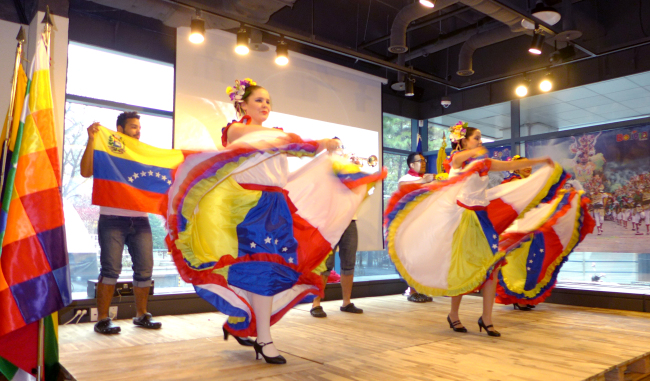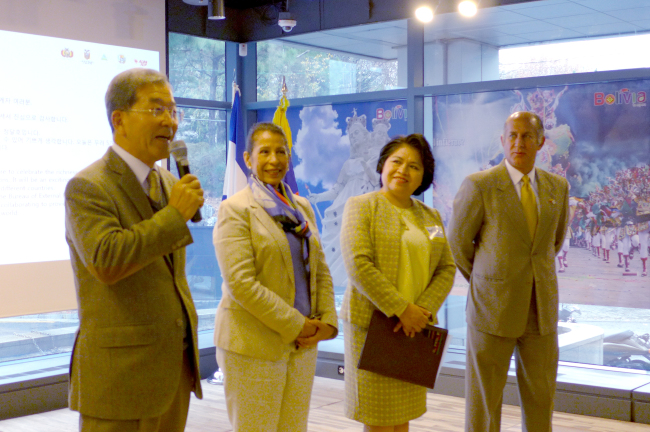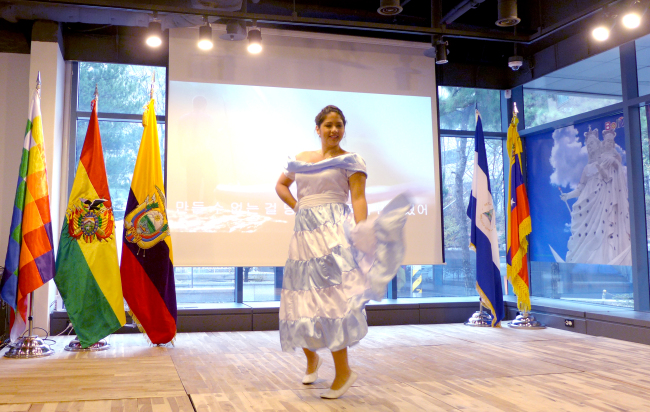The embassies of Bolivia, Ecuador, Nicaragua and Venezuela, in collaboration with the World Culture Open, celebrated the establishment of a regional organization with a promotional event dubbed “Hello! Alba-Latin America” in late November.
The Bolivian Alliance for the Peoples of our America, or Alba, was founded by Cuba and Venezuela on Dec. 14, 2004, for the purpose of integrating Latin America and the Caribbean.
Since then, Alba has acted as an institutional vanguard for human rights, public health, food delivery, education for the underprivileged and trade within and across its 11 member countries: Antigua and Barbuda, Bolivia, Cuba, Dominica, Ecuador, Grenada, Nicaragua, Saint Kitts and Nevis, Saint Lucia, Saint Vincent and the Grenadines and Venezuela.
 |
Venezuelan students perform a traditional dance at the “Hello! Alba-Latin America” event at the JoongAng Cultural Center in Seoul on Nov. 28. Joel Lee/The Korea Herald |
As an alternative to the Free Trade Agreement of the Americas, which faced fierce public resistance, the watershed agreement laid the ground for exchanging petroleum, teachers and doctors between Cuba and Venezuela, and was later joined by other countries.
“Let me recall why the integration started in the first place,” said Bolivian Ambassador Guadalupe Palomeque said in a speech at the event at the JoongAng Cultural Center in Seoul on Nov. 28.
“It was to show that it is possible to form an alternative relationship between the countries through people’s cooperation, solidarity and economic complementarity.”
The ambassador said that until the early 2000s, both developed and developing countries ran headlong into free trade agreements as “the only way to achieve growth,” disregarding their economic asymmetries and people’s actual needs.
“Free trade ignored the urgent construction of social agendas in Latin America,” Palomeque argued.
 |
(From left) World Culture Open director general Jung Dal-ho, Venezuelan embassy charge d’affaires Yadira Hidalgo, Bolivian Ambassador Guadalupe Palomeque and Ecuadorian Ambassador Oscar Herrera pose at the “Hello! Alba-Latin America” event at the JoongAng Cultural Center in Seoul on Nov. 28. Joel Lee/The Korea Herald |
For the last 11 years, Alba has made significant strides in political, economic and social areas, the envoy claimed, including providing literacy to low-income groups, health care for blind and disabled people and food to malnourished communities.
To date, 12 agricultural projects worth $37 million have been financed across Belize, Guyana, Haiti, Jamaica, Nicaragua, Saint Kitts and Nevis; some 3,500 families and 17,000 people have received medical attention; and 1.3 million people with disabilities have been treated.
In October 2009, the Alba leaders agreed at a summit in Bolivia to create a common regional currency ― “sucre” ― which would serve as an “autonomous and sovereign” monetary system replacing the U.S. dollar. Venezuela and Ecuador signed the first bilateral trade agreement using the sucre on July 6, 2010.
The sucre eliminates exchange costs in trade, and reduces import costs and international payment time. The Alba Bank, founded in the Venezuelan capital of Caracas in 2008, finances the integrative processes “without any political stipulations,” the Bolivian Embassy said.

Since 2005, media corporations such as Telesur, La Radio del Sur and Alba TV have broadcast news and cultural contents across the bloc “that reflect the countries’ realities and peoples’ idiosyncrasies,” it said.
The event in Seoul featured performances by Bolivian, Ecuadorian and Venezuelan artists and students, and traditional pies or “empanadas” from different countries to taste.
By Joel Lee (
joel@heraldcorp.com)












![[Today’s K-pop] Blackpink’s Jennie, Lisa invited to Coachella as solo acts](http://res.heraldm.com/phpwas/restmb_idxmake.php?idx=644&simg=/content/image/2024/11/21/20241121050099_0.jpg)